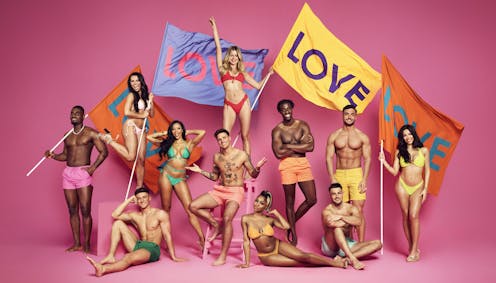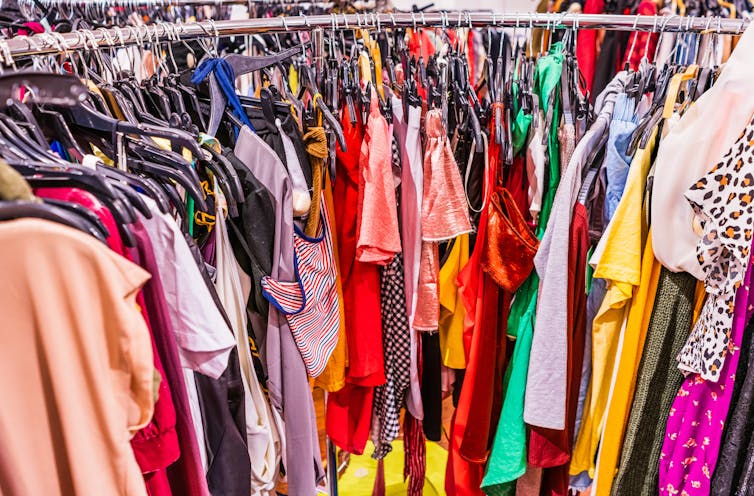
This year, contestants on the TV show Love Island will be scantily clad in secondhand rather than new clothing – a pivot away from fast fashion that could influence more eco-conscious shopping habits in fans. The beloved reality show will return to televisions next week, and with it, an array of colourful bikinis and skintight outfits that viewers will seek out in order to dress like their favourite Islanders.
For the past three years Love Island has partnered with online fast fashion brand I Saw it First, which sponsored the show and provided clothes for contestants. This year, Love Island will be sponsored by eBay, and contestants will be dressed in secondhand outfits on screen.
Sustainability advocates will welcome the change, having criticised the show for encouraging fast fashion consumption. In June 2019, the online fashion retailer Missguided advertised a £1 bikini during a commercial break for Love Island. Former Love Island contestants were used as models to promote the bikini, cementing the link between fast fashion and reality television.

This article is part of Quarter Life, a series about issues affecting those of us in our twenties and thirties. From the challenges of beginning a career and taking care of our mental health, to the excitement of starting a family, adopting a pet or just making friends as an adult. The articles in this series explore the questions and bring answers as we navigate this turbulent period of life.
You may be interested in:
Rihanna and radical pregnancy fashion – how the Victorians made maternity wear boring
Wagatha Christie: what the Vardy v Rooney case can teach you about avoiding libel on social media
Cluttercore: Gen Z’s revolt against millennial minimalism is grounded in Victorian excess
Excessively low price points encourage a throwaway culture by implying that clothing has no value. Missguided said the £1 bikini was a promotional item “sourced to the same high standards as all of our other products”, and that the company absorbed the production cost as a gift to customers.
Of course, partnering with eBay won’t discourage consumption overall. Viewers will be able to explore eBay’s “preloved fashion” via the official Love Island app, where they can purchase similar outfits to what they can see on screen. The sponsorship may well encourage consumers to purchase secondhand clothing while the show is airing over eight weeks.
Influencing shopping habits
The show will still create influencers, who may form lucrative partnerships with fast fashion brands once they leave the villa. Last year’s winner, Millie Court, has since signed a deal with ASOS and launched her own range. Perhaps the most commercially successful contestant is Molly Mae Hague, who landed a six-figure clothing deal with Pretty Little Thing in 2019, before being named their creative director in 2021.
Young consumers follow Love Island contestants and other reality celebrities on social media, and this affects their fashion purchasing choices. These celebrities often remain in the public eye after appearing on television, promoting fashion brands through their platforms. Shoppers look to reality stars for fashion inspiration, and many report being swayed by digital influencers to make purchase decisions.
Love Island is especially influential in the UK. In 2018, 80,000 hopefuls applied to appear on the show, while just 19,400 people applied to the University of Oxford that same year. Appearing on Love Island for eight weeks is likely to earn you more money over the course of your life than three years at Oxbridge.

It is not uncommon for contestants to leave the show with over a million followers on social media. This is appealing to brands, who then pay these contestants to advertise their products. All of this has contributed to changing values among younger generations, who admire the instant success achieved by reality stars.
Reality celebrities and other influencers use social media to encourage followers to purchase the clothing they advertise at the click of a button. The instant gratification of purchasing clothes, without the need to visit the local high street, adds to the desirability – and disposable nature – of fast fashion.
Fast fashion and the planet
The detrimental environmental impacts of the fast fashion industry are well documented. In the UK, people buy more clothes per person than in any other country in Europe. The fashion industry in the UK grows at a faster rate than the rest of the economy, and an estimated £140 million worth of clothing is sent to landfill each year. Many fast fashion garments are not made from single fibre materials, and therefore cannot be recycled. Fashion is destroying the planet, and yet we keep buying clothes.

Fast fashion is affordable, meaning that it is not always high quality, and often doesn’t contain durability or longevity. It is also resource intensive, and when disposed of in landfill, takes an extremely long time to biodegrade.
However, it is possible to love fashion and still be environmentally aware. Changes in consumer values, vintage inspirations used by current fashion designers, and increased sustainability awareness have fuelled a growing popularity of the secondhand clothing market.
Love Island’s decision to ditch fast fashion sponsors in favour of secondhand options is a step in the right direction. It will be interesting to see if this year’s contestants go on to partner with fast fashion brands or more sustainable and secondhand options upon leaving the show -– this may be the real test of success of the partnership with eBay.
Rose Marroncelli does not work for, consult, own shares in or receive funding from any company or organisation that would benefit from this article, and has disclosed no relevant affiliations beyond their academic appointment.
This article was originally published on The Conversation. Read the original article.







